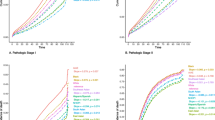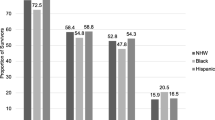Abstract
Colorectal cancer (CRC) remains a leading cause of morbidity and mortality in the U.S. Disparities in access to care contribute to advanced CRC stage at diagnosis, and these disparities are most pronounced among underserved populations and ethnic minorities. We aim to evaluate race/ethnicity-specific disparities in CRC stage at diagnosis among an ethnically diverse, urban safety-net hospital. We retrospectively evaluated all adult CRC patients diagnosed from January 1, 2009 to October 1, 2015. CRC cases were confirmed by histopathology specimens from biopsies and/or surgical resection. CRC staging utilized American Joint Committee on Cancer (AJCC) staging systems and were stratified by race/ethnicity. Multivariate logistic regression models were utilized to evaluate disparities in AJCC stage at presentation (stage 3–4 vs. stage 0–2). Among 311 patients with CRC [51.5% male, 25.3% black, 18.7% Hispanic, 32.0% Asian, and mean age at diagnosis 58.1 years (SD 10.3)] 61.4% had advanced ACC stage 3–4 CRC at diagnosis. Among black patients with CRC, 73.3% had AJCC stage 3–4 cancer at time of diagnosis. On multivariate regression, blacks were nearly four times more likely to have advanced AJCC stage 3–4 CRC at diagnosis compared to whites (OR 3.70; 95% CI 0.97–14.11; p = 0.055). Among a diverse underserved population, over 60% of CRC were AJCC stage 3–4 at diagnosis, and nearly 75% of blacks with CRC had AJCC stage 3–4 at diagnosis. Advanced stage CRC at diagnosis limits options for potentially curative therapies, and increases the risk for cancer recurrence and mortality.


Similar content being viewed by others
Abbreviations
- AJCC:
-
American Joint Committee on Cancer
- CRC:
-
Colorectal cancer
- OR:
-
Odds ratio
- SD:
-
Standard deviation
References
Siegel, R. L., Miller, K. D., & Jemal, A. (2016). Cancer statistics, 2016. CA: A Cancer Journal for Clinicians, 66(1), 7–30. doi:10.3322/caac.21332.
Surveillance E, and End Results (SEER) Program (http://www.seer.cancer.gov) SEER*Stat Database: Incidence - SEER 9 Regs Research Data, Nov 2012 Sub (1973–2010) < Katrina/Rita Population Adjustment> - Linked To County Attributes - Total U.S., 1969–2011 Counties, National Cancer Institute, DCCPS, Surveillance Research Program, Surveillance Systems Branch, released April 2013, based on the November 2012 submission.
Gupta, A. K., Melton, L. J. 3rd, Petersen, G. M., et al. (2005). Changing trends in the incidence, stage, survival, and screen-detection of colorectal cancer: A population-based study. Clinical Gastroenterology and Hepatology: The Official Clinical Practice Journal of the American Gastroenterological Association, 3(2), 150–158.
Wong, R. J. (2010). Marked variations in proximal colon cancer survival by race/ethnicity within the United States. Journal of Clinical Gastroenterology, 44(9), 625–630. doi:10.1097/MCG.0b013e3181c64a7a.
Regula, J., Rupinski, M., Kraszewska, E., et al. (2006). Colonoscopy in colorectal-cancer screening for detection of advanced neoplasia. The New England Journal of Medicine, 355(18), 1863–1872. doi:10.1056/NEJMoa054967.
Mandel, J. S., Bond, J. H., Church, T. R., et al. (1993). Reducing mortality from colorectal cancer by screening for fecal occult blood. Minnesota Colon Cancer Control Study. The New England Journal of Medicine, 328(19), 1365–1371. doi:10.1056/NEJM199305133281901.
Mandel, J. S., Church, T. R., Bond, J. H., et al. (2000). The effect of fecal occult-blood screening on the incidence of colorectal cancer. The New England Journal of Medicine, 343(22), 1603–1607. doi:10.1056/NEJM200011303432203.
Lai, Y., Wang, C., Civan, J. M., et al. (2016). Effects of cancer stage and treatment differences on racial disparities in survival from colon cancer: A United States population-based study. Gastroenterology, 150(5), 1135–1146. doi:10.1053/j.gastro.2016.01.030.
Silber, J. H., Rosenbaum, P. R., Ross, R. N., et al. (2014). Racial disparities in colon cancer survival: A matched cohort study. Annals of Internal Medicine, 161(12), 845–854. doi:10.7326/M14-0900.
May, F. P., Almario, C. V., Ponce, N., & Spiegel, B. M. (2015). Racial minorities are more likely than whites to report lack of provider recommendation for colon cancer screening. The American Journal of Gastroenterology, 110(10), 1388–1394. doi:10.1038/ajg.2015.138.
Almario, C. V., May, F. P., Ponce, N. A., & Spiegel, B. M. (2015). Racial and ethnic disparities in colonoscopic examination of individuals with a family history of colorectal cancer. Clinical Gastroenterology and Hepatology: The Official Clinical Practice Journal of the American Gastroenterological Association, 13(8), 1487–1495. doi:10.1016/j.cgh.2015.02.038.
Myers, R. E., Sifri, R., Daskalakis, C., et al. (2014). Increasing colon cancer screening in primary care among African Americans. Journal of the National Cancer Institute, 106(12), dju344. doi:10.1093/jnci/dju344.
Polite, B. N., Dignam, J. J., & Olopade, O. I. (2005). Colorectal cancer and race: Understanding the differences in outcomes between African Americans and whites. The Medical Clinics of North America, 89(4), 771–793. doi:10.1016/j.mcna.2005.03.001.
Chien, C., Morimoto, L. M., Tom, J., & Li, C. I. (2005). Differences in colorectal carcinoma stage and survival by race and ethnicity. Cancer, 104(3), 629–639. doi:10.1002/cncr.21204.
Schoen, R. E., Razzak, A., Yu, K. J., et al. (2015). Incidence and mortality of colorectal cancer in individuals with a family history of colorectal cancer. Gastroenterology, 149(6), 1438–1445. doi:10.1053/j.gastro.2015.07.055.
Schoen, R. E., Pinsky, P. F., Weissfeld, J. L., et al. (2012). Colorectal-cancer incidence and mortality with screening flexible sigmoidoscopy. The New England Journal of Medicine, 366(25), 2345–2357. doi:10.1056/NEJMoa1114635.
Nishihara, R., Wu, K., Lochhead, P., et al. (2013). Long-term colorectal-cancer incidence and mortality after lower endoscopy. The New England Journal of Medicine, 369(12), 1095–1105. doi:10.1056/NEJMoa1301969.
Jung, H. M., Lee, J. S., Lairson, D. R., & Kim, Y. (2015). The effect of national cancer screening on disparity reduction in cancer stage at diagnosis by income level. PLoS ONE, 10(8), e0136036. doi:10.1371/journal.pone.0136036.
Tawk R, Abner A, Ashford A, & Brown CP.( 2016). Differences in colorectal cancer outcomes by race and insurance. International Journal of Environmental Research and Public Health, 13(1), 48. doi:10.3390/ijerph13010048.
Le, H., Ziogas, A., Lipkin, S. M., & Zell, J. A. (2008). Effects of socioeconomic status and treatment disparities in colorectal cancer survival. Cancer epidemiology, biomarkers & prevention: A publication of the American Association for Cancer Research, cosponsored by the American Society of Preventive. Oncology, 17(8), 1950–1962. doi:10.1158/1055-9965.EPI-07-2774.
Clegg, L. X., Reichman, M. E., Miller, B. A., et al. (2009). Impact of socioeconomic status on cancer incidence and stage at diagnosis: Selected findings from the surveillance, epidemiology, and end results: National Longitudinal Mortality Study. Cancer Causes & Control, 20(4), 417–435. doi:10.1007/s10552-008-9256-0.
Pruitt, S. L., Shim, M. J., Mullen, P. D., Vernon, S. W., & Amick, B. C. 3rd, (2009). Association of area socioeconomic status and breast, cervical, and colorectal cancer screening: A systematic review. Cancer epidemiology, biomarkers & prevention: A publication of the American Association for Cancer Research, cosponsored by the American Society of Preventive. Oncology, 18(10), 2579–2599. doi:10.1158/1055-9965.EPI-09-0135.
Jones, R. M., Devers, K. J., Kuzel, A. J., & Woolf, S. H. (2010). Patient-reported barriers to colorectal cancer screening: A mixed-methods analysis. American Journal of Preventive Medicine, 38(5), 508–516. doi:10.1016/j.amepre.2010.01.021.
Author information
Authors and Affiliations
Corresponding author
Ethics declarations
Conflict of interest
The authors of this manuscript have no conflicts of interest to disclose.
Rights and permissions
About this article
Cite this article
Chan, C., Lopez, A., Castaneda, G. et al. Black Patients with Colorectal Cancer Have More Advanced Cancer Stage at Time of Diagnosis: A Community-Based Safety-Net Hospital Experience. J Community Health 42, 724–729 (2017). https://doi.org/10.1007/s10900-016-0309-0
Published:
Issue Date:
DOI: https://doi.org/10.1007/s10900-016-0309-0




